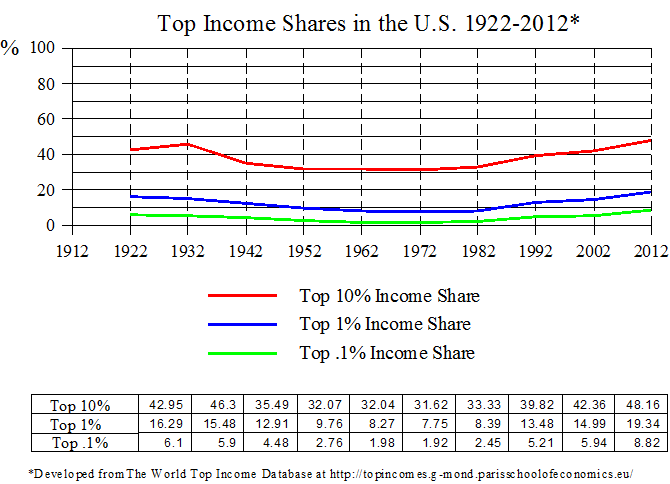
Links to Piketty's Data, and Some Reviews of this Controversial Book
Note by James R. Martin, Ph.D., CMA
Professor Emeritus, University of South Florida
Economics
Related Main Page | Capital Markets Main Page
Piketty's book is about income inequality. The online database allows visitors to generate income data and grahics for a variety of countries. I developed the following illustration to convey the idea. However, visitors to the database don't need to develop any graphics. They simply pick the country, top income group, and range, then the database program automatically displays the data and graphs.
For example, Piketty's data (based on tax records) show that the top 10% in the U.S. earned 48.16% of the income in 2012. The top 1% earned 19.34%, while the top .1% earned 8.82% of the income.

The following reviews of Thomas Piketty's book are from Paul Caron's Blog*. I was made aware of this list by Bob Jensen.
Businessweek, Six Strange Facts About the No. 1 Book on Amazon.com
Financial Times, Lessons From a Rock-Star Economist
Forbes, Piketty's Capital Shortcomings
Harvard Business Review, Piketty’s “Capital,” in a Lot Less than 696 Pages
Los Angeles Times, Thomas Piketty's Income Inequality Tome Tops Amazon Bestseller Lists
Monthly Review, Deeper Reflections on Thomas Piketty's "Capital"
Quartz, Ten Ways to Fight Inequality Without Piketty’s Wealth Tax
Time, Here’s Why This Best-Selling Book Is Freaking Out the Super-Wealthy
Vox, Thomas Piketty Doesn’t Hate Capitalism: He Just Wants to Fix It
Wall Street Journal, Thomas Piketty Revives Marx for the 21st Century: An 80% Tax Rate on Incomes Above $500,000 Is Not Meant to Bring in Money for Education or Benefits, but 'to Put an End to Such Incomes'
_______________________________________________
Related Sites:
An organization with the goal of stimulating policy changes within U.S. higher education to help arrest the dangerous and growing economic divergence between rich and poor in out country". Social Mobility Index
Related summaries:
Buchanan, M. 2002. Wealth happens. Harvard Business Review (April): 49-54. (Buchanan describes a universal law of wealth based on a network effect that appears to have some important implications for economic policy). (Note).
Thurow, L. C. 1996. The Future of Capitalism: How Today's Economic Forces Shape Tomorrow's World. William Morrow and Company. (Summary).